Thursday
02.2026
Ha Giang Loop Vs Hai Van Pass: Which Motorbike Journey Fits You Best?
08 Apr - 2025
Vietnam is a motorbiker’s paradise, offering routes catering to every rider level. Among the most talked-about journeys are the Ha Giang Loop and Hai Van Pass. Both are scenic, iconic, and worthy but offer different experiences. Whether after rugged landscapes and ethnic culture or an easy coastal escape, knowing the difference between Ha Giang Loop vs Hai Van Pass helps you choose the journey that genuinely fits your travel style. So, what is the difference between Hai Van Pass and Ha Giang Loop? This guide by Ha giang motorbike tours will compare each route’s highlights, challenges, and cultural depth.
When it comes to true motorbike adventures in Vietnam, Ha Giang Loop vs Hai Van Pass is a standard comparison. The Ha Giang Loop stands out for thrill-seekers looking to test their skills and stamina. This 350km route takes you through rugged mountains, rice terraces, winding rivers, and remote ethnic villages. Along the way, travelers can connect with H’mong, Dao, and Tay ethnic groups, making it an authentic cultural journey.
The Ha Giang Loop is packed with jaw-dropping highlights, making it one of Southeast Asia’s most rewarding motorbike trips. The Ma Pi Leng Pass is the destination in Ha Giang that every motorbiker wants to conquer due to its dramatic Ha Giang mountain passes, carved along cliffs, offering views over the deep green waters of the Nho Que River far below. Another must-see is the Dong Van Karst Plateau, a UNESCO Global Geopark known for its unique limestone formations and ancient rock layers. This area showcases surreal landscapes, high-altitude plateaus, and traditional H’mong villages dotting the hillsides.
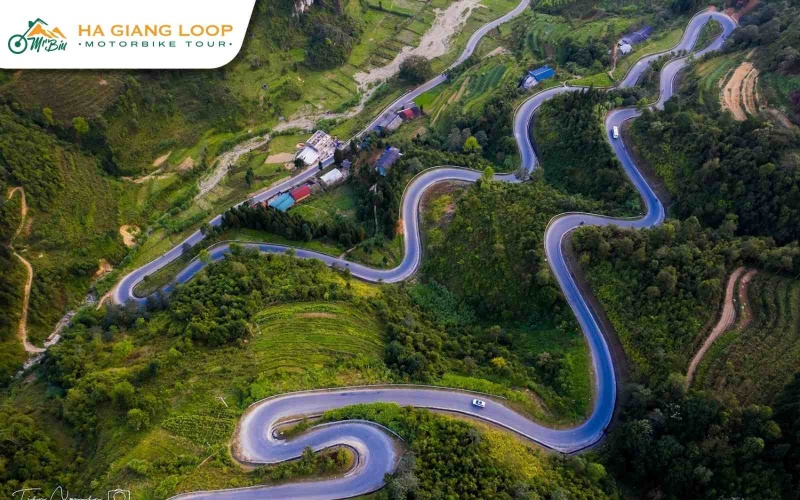
Beyond the scenery, the Ha Giang Loop offers unmatched cultural immersion. You can stay in local homestays with ethnic minorities, sharing daily meals and stories. Tourists can also stay in local homestays, sleep in stilt houses, share home-cooked meals, and engage in warm, authentic conversations with hosts from H’mong, Dao, or Tày communities to have a chance to live like a local.

Food in Ha Giang is special. You can try corn wine, a strong local drink made from corn, and traditional foods such as “Thang co” or buckwheat cakes everywhere. These meals aren’t just food; they tell stories through their flavors. Plus, visitors can visit weekly markets like Dong Van or Meo Vac to see local people trading goods, hanging out, and even meeting someone special. During festivals in Ha Giang, you might see traditional dances, music, and unique ceremonies to have a rare look at the customs that make this mountain area unique.
If you’re short on time but still want a scenic ride, the Hai Van Pass is your best bet. Stretching only 21km, it connects Da Nang and Hue with smooth, well-paved roads suitable even for beginners. The route wraps around mountain curves with open views of the sea, offering one of the most photogenic rides in Vietnam. It’s ideal for a half-day trip, often combined with nearby attractions like Linh Ung Pagoda, Lang Co Beach, or Hoi An.
The Hai Van Pass isn’t just about the ride; it’s steeped in natural and historical value. It marks the climatic boundary between northern and southern Vietnam. When traveling to this spot, you’ll find remnants of French forts and panoramic views stretching over the East Sea. Top Gear recognized it as “the most beautiful coastal road in the world,” and it combines easy riding with unforgettable vistas.
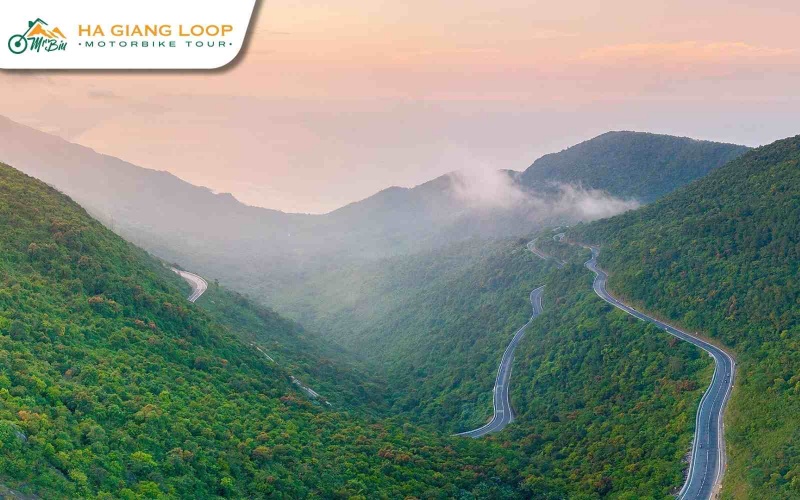
The area surrounding the Hai Van Pass is perfect for travelers looking to blend nature with local life. Stop by Lang Co fishing village for fresh seafood caught that morning, or head to Hoi An for a hands-on cooking class that promises an unforgettable experience. To make the most of your trip, you can also explore the Marble Mountains (Ngu Hanh Son)—a mix of caves, pagodas, and viewpoints just outside Da Nang.
The Hai Van Pass is close to Da Nang International Airport, making it convenient for travelers with tight schedules. It fits nicely into short itineraries, especially for international visitors. Unlike the Ha Giang Loop, planning for overnight stays or harsh conditions in Hai Van Pass is unnecessary. You can easily rent a motorbike and enjoy a few hours on the pass without the logistics of a long-haul trip.
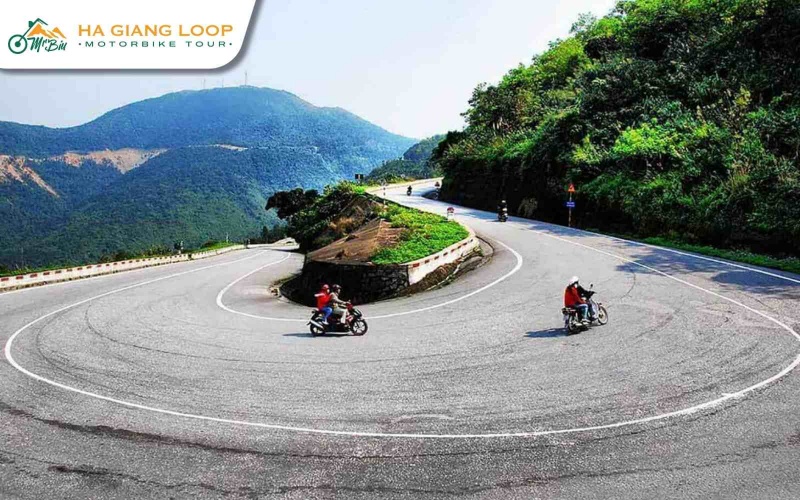
Vietnam offers two iconic motorbike routes, including Hai Van Pass and Ha Giang Loop, each with a different charm and rhythm. So, what is the best option for you? Let’s compare Ha Giang Loop and Hai Van Pass side by side to help you pick the journey that matches your travel style:
| Criteria | Ha Giang Loop | Hai Van Pass |
| Scenery styles | Towering mountains, rice terraces, deep valleys | Coastal views, ocean on one side, mountains on the other |
| Route length | 350 kilometers, take 3 – 5 days to conquer | 21 kilometers, take about 5 – 6 hours |
| Riding difficulty | Challenging, rugged roads | Easier, smoother roads |
| Culture | Interactions with local ethnic minority groups | Minimal cultural immersion |
| Adventure | High–hairpin turns, steep inclines | Moderate – scenic but less thrilling |
| Tourism | Low – off the beaten path | High – popular with tourists |
| Overall experience | Authentic, valuable adventure | The quick, picturesque ride |
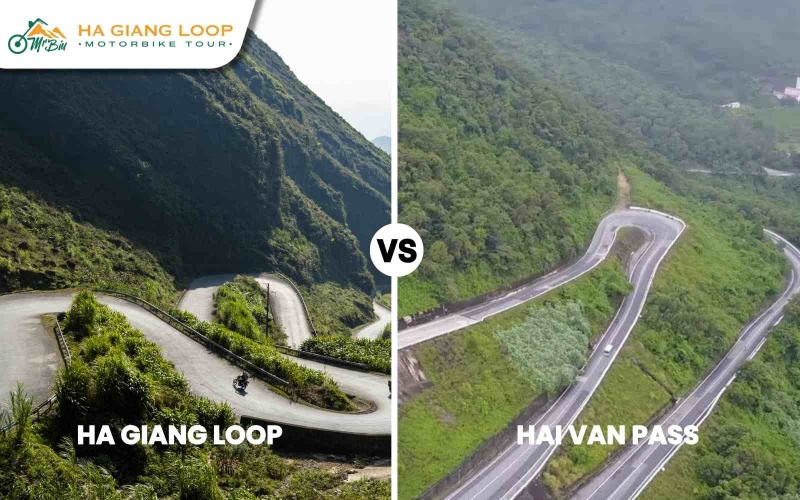
Yes, riding the Ha Giang Loop solo or Hai Van Pass alone is possible. You can ride independently to have a more flexible and adventurous trip. However, suppose you’re new to motorbiking or unsure about handling sharp curves and changing terrain. In that case, you can hire an easy rider—a local driver who will take you on the motorbike while you enjoy the scenery. This choice is especially popular on the Ha Giang Loop due to its challenging mountain roads.
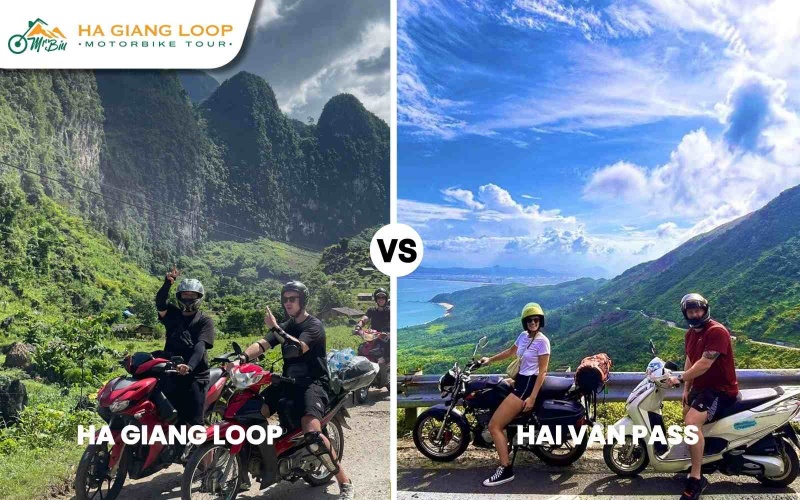
The ideal time to travel Ha Giang Loop trip is during the dry months of September to November and March to May. These periods offer pleasant weather, clearer skies, and stunning views of rice terraces and majestic mountains.
In contrast, the Hai Van Pass enjoys more stable weather year-round thanks to its coastal location. However, it’s wise to avoid the rainy season, usually from October to December, when fog and rain can reduce visibility.
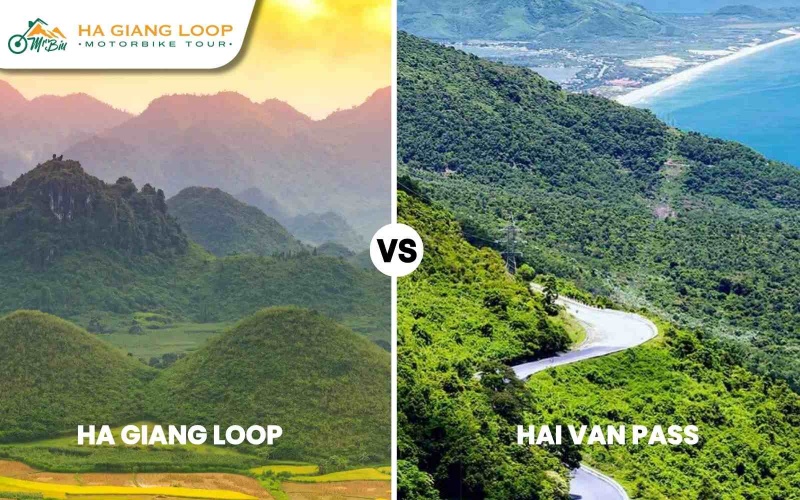
Time is a significant factor when deciding between the Ha Giang Loop vs Hai Van Pass for motorbike trip. The Ha Giang Loop typically takes 3 to 5 days to complete, depending on your starting point, number of stops, and overnight stays. It’s a multi-day journey through the northern highlands.
On the other hand, the Hai Van Pass is a short 21km ride, often completed in under an hour—though most riders take longer to stop and enjoy the views. It’s commonly included in a full-day trip between Hue and Hoi An, which totals around 5–6 hours. If you’re limited on time, Hai Van might suit you better. But for those craving a longer, more profound journey, Ha Giang delivers.
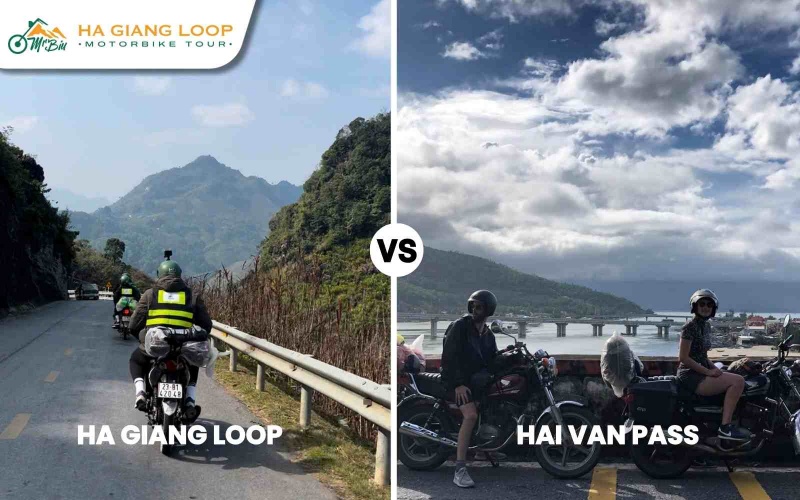
Whether you choose the Hai Van Pass or Ha Giang Loop, safety should always be a top priority. Below are some essential safety tips to help motorbike travelers confidently enjoy the journey:
The Ha Giang Loop is known for its dramatic landscapes, but it also means confronting unpredictable weather. Thick fog, sudden rain, and narrow, winding roads can make driving tricky, primarily through mountain passes like Ma Pi Leng. Road conditions in Ha Giang Loop may change quickly, and visibility can drop dramatically in early mornings or late afternoons.
In contrast, the Hai Van Pass is shorter and generally easier to navigate as it has well-paved roads and gentle curves. However, adventurers should watch out for early morning fog, rain (especially during the rainy season from October to November), large trucks near the tunnels, and sharp turns. These can catch riders off guard if you’re not paying attention.
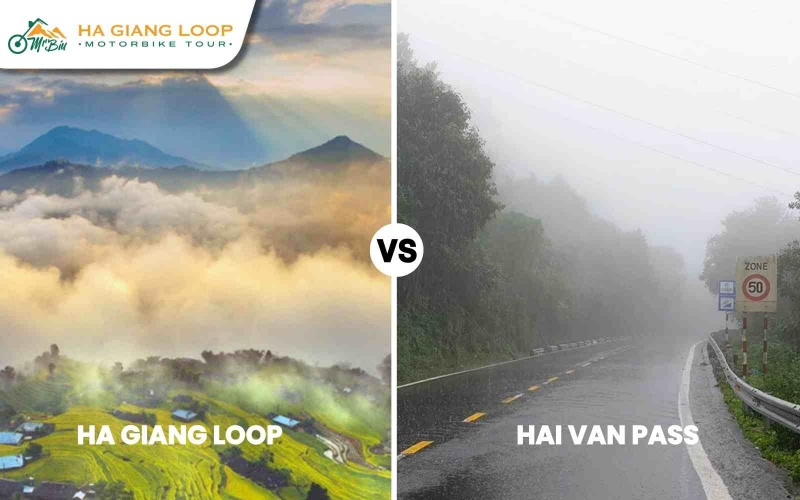
Whether you’re doing the Ha Giang Loop or Hai Van Pass for beginners or pros, being well-prepared makes all the difference. Wear proper protective gear, including a full-face helmet, gloves, and padded clothing. Besides, you should always inspect your motorbike before hitting the road: brakes, tires, lights, and horn should all be in top condition. A raincoat, essential repair tools, and enough fuel are also the things you should prepare, especially in Ha Giang, where gas stations can be far apart. While some travelers might hear that the Ha Giang Loop dangerous, knowing what to pack for Ha Giang Loop beforehand can truly make your trip smoother.
Riding in a group is also brilliant if you’re unfamiliar with the area. Riding with others adds a layer of safety in case of breakdowns or unexpected challenges. Lastly, don’t forget to download offline maps and carry some cash since remote areas in Hai Van Pass vs Ha Giang Loop might not have internet or ATMs.
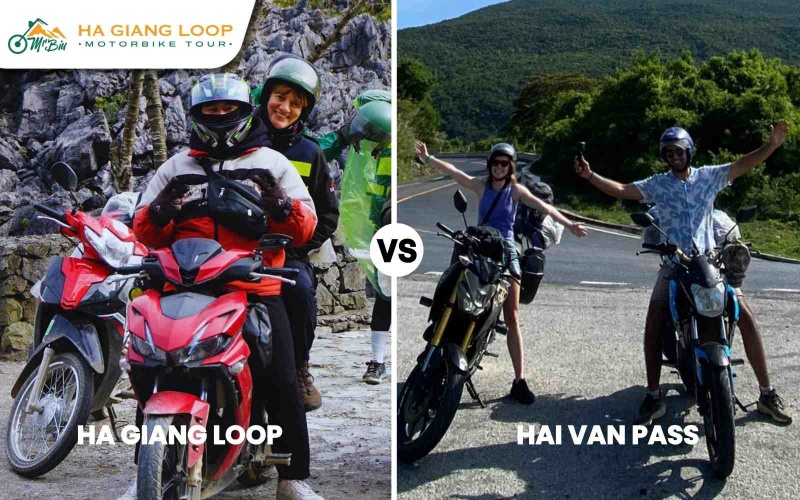
If you desire to experience the legendary Ha Giang Loop but are not confident riding a motorbike yourself, let Mr. Biu Tour Ha Giang be your guide. Our Ha Giang motorbike tour 3 days, and Ha Giang motorbike tour 4 days 3 nights are designed for travelers who seek adventure without the stress of driving. We promise to offer an authentic, worry-free adventure led by local experts. Here’s why it’s a top choice for first-timers and solo travelers alike:

In fact, the destination of Ha Giang Loop vs Hai Van Pass, which is worth your trip, depends entirely on what kind of motorbike adventure you’re looking for. For those ready to take on Ha Giang, Mr.Biu Tour Ha Giang provides curated motorbike tours for adventurous travelers. Whether you’re a solo rider or a group of friends, Mr.Biu Tour Ha Giang gives you everything you need for a safe, memorable journey. For more detailed information, please don’t hesitate to contact us via:
